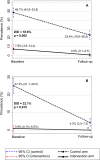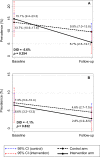(S)WASH-D for Worms: A pilot study investigating the differential impact of school- versus community-based integrated control programs for soil-transmitted helminths
- PMID: 29723193
- PMCID: PMC5933686
- DOI: 10.1371/journal.pntd.0006389
(S)WASH-D for Worms: A pilot study investigating the differential impact of school- versus community-based integrated control programs for soil-transmitted helminths
Abstract
Background: Soil-transmitted helminths (STH) infect nearly 1.5 billion individuals globally, and contribute to poor physical and cognitive development in children. STH control programs typically consist of regular delivery of anthelminthic drugs, targeting school-aged children. Expanding STH control programs community-wide may improve STH control among school-aged children, and combining deworming with improvements to water, sanitation and hygiene (WASH) may further reduce transmission. The (S)WASH-D for Worms pilot study aims to compare the differential impact of integrated WASH and deworming programs when implemented at primary schools only versus when additionally implemented community-wide.
Methodology/principal findings: A two-arm, non-randomized cluster intervention study was conducted. Six communities were identified by partner WASH agencies and enrolled in the study. All communities received a school-based WASH and deworming program, while three additionally received a community-based WASH and deworming program. STH infections were measured in school-aged children at baseline and six months after deworming. Over 90% of eligible children were recruited for the study, of whom 92.3% provided stool samples at baseline and 88.9% at follow-up. The school WASH intervention improved school sanitation, while the community WASH intervention reduced open defecation from 50.4% (95% CI 41.8-59.0) to 23.5% (95% CI 16.7-32.0). There was a trend towards reduced odds of N. americanus infection among children who received the community-wide intervention (OR 0.42, 95% CI 0.07-2.36, p = 0.32).
Conclusions: This pilot study provides proof of principle for testing the hypothesis that community-wide STH control programs have a greater impact on STH infections among children than school-based programs, and supports the rationale for conducting a full-scale cluster randomized controlled trial. High recruitment and participation rates and successful implementation of school WASH programs demonstrate study feasibility and acceptability. However, eliminating open defecation remains a challenge; ongoing work is required to develop community sanitation programs that achieve high and sustainable latrine coverage.
Trial registration: Australian New Zealand Clinical Trials Registry (ANZCTR) ACTRN12615001012561.
Conflict of interest statement
The authors have declared that no competing interests exist.
Figures



References
-
- Pullan RL, Smith JL, Jasrasaria R, Brooker SJ. Global numbers of infection and disease burden of soil transmitted helminth infections in 2010. Parasit Vectors. 2014;7: 37 doi: 10.1186/1756-3305-7-37 - DOI - PMC - PubMed
-
- Bethony J, Brooker S, Albonico M, Geiger SM, Loukas A, Diemert D, et al. Soil-transmitted helminth infections: ascariasis, trichuriasis, and hookworm. Lancet. 2006;367: 1521–1532. doi: 10.1016/S0140-6736(06)68653-4 - DOI - PubMed
-
- Brooker S, Bethony J, Hotez PJ. Human hookworm infection in the 21st century. Adv Parasitol. 2004;58: 197–288. doi: 10.1016/S0065-308X(04)58004-1 - DOI - PMC - PubMed
-
- World Health Organization. Preventive chemotherapy in human helminthiasis Geneva: World Health Organization, 2006.
Publication types
MeSH terms
Substances
LinkOut - more resources
Full Text Sources
Other Literature Sources

